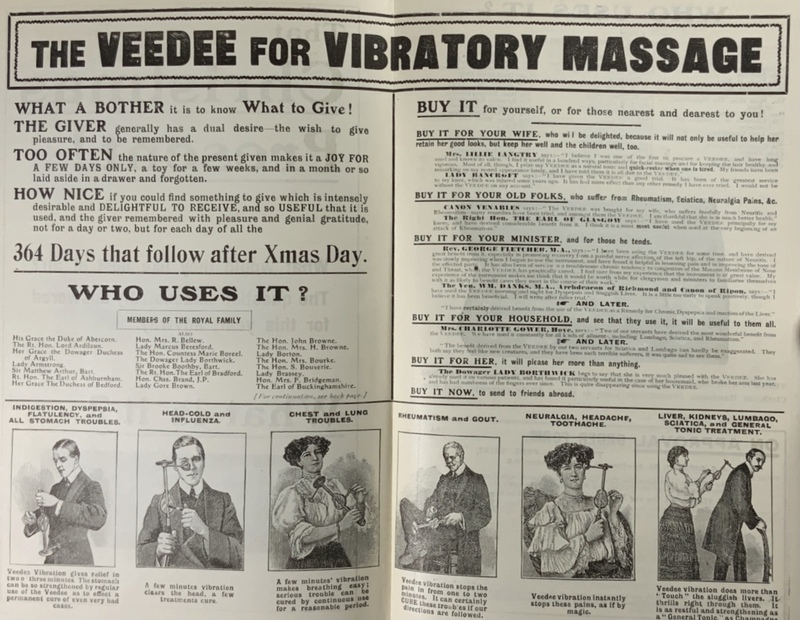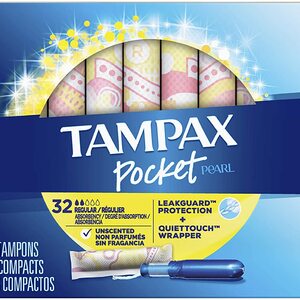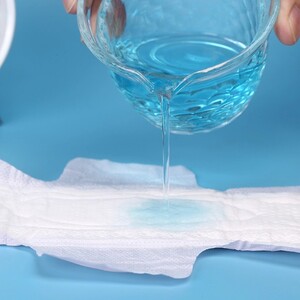Enduring Standards: Marketing the Normal Female Today
While the medical field has made substantial progress in de-pathologizing women’s bodies, the impact of its former common-practice “diagnoses” — exemplified by the Hysteria epidemic of the 19th century — persists in general societal norms and consumer culture in the 21st century. In particular, normal functions of the vagina continue to be categorized abnormal as a means of exploiting women financially. While today’s advertisements no longer pathologize women as explicitly as advertisements of the late 19th and early 20th century did, they still strongly emphasize the male gaze and the idea that processes endemic to the female body are shameful.
These magazine advertisements spanning from 1895-1907 make vague claims about relieving women of their “female ailments” with the intention of making them more useful to men. In particular, one of the Beecham’s pills advertisements seems to imply that there is something inherently wrong with the wife medicially, since her unspecified ailment can be fixed by taking their medication. However the line "best wife I ever had" implies that the pills primarily affect her disposition. Perhaps the point was to not ask too many questions about what the pills were really doing, since it was common knowledge that women were inherently flawed and the magazine said that Beecham's pills were supposed to help?
Advertisement for Beecham’s in The Idler Vol. 8
BEECHAM'S PILLS for all bilious and nervous disorders such as sick headache, constipation, weak stomach, impaired digestion, disordered liver and female ailments.
Present day advertisements continue to reflect the male gaze through their unwillingness to accurately represent menstruation so as not to make men uncomfortable by forcing them to view something “abnormal”. Pad advertisers use blue liquid rather than red to create as much distance between the viewer and the process of menstruation as possible. Tampon boxes highlight high-tech features such as quiet wrappers, allowing them to charge more for a necessity while simultaneously reinforcing the idea that the female body and natural processes like menstruation are something shameful, something that no one should even know about or, god-forbid, hear about. Similarly, other tampons contain harmful fragrance but sell boxes based on the promise that their tampons alone can hide a woman’s period, and thus her inherent abnormality.
However, as women gain more power and authority, they increasingly challenge these ideas and practices that pathologize half of the world’s population. Pad manufacturers like Bodyform and Kotex have run a collection of satirical television advertisements that criticize advertising trends like the infamous white pants or blue liquid that saturate, no pun intended, the feminine products market.
Similarly, recent years have witnessed more women challenging male conceptions of what the female body, particularly the vagina, should be like without regard for a woman’s health. Women in medicine have pushed back against products like Summer’s Eve that promise to “cleanse” the vagina of bacteria, odor, and inherent sin without recognizing that this complex organ has its own processes to protect itself. Women in entertainment, like Cardi B and Megan Thee Stallion have also challenged societal conceptions regarding the female body through songs like “WAP (Wet Ass Pussy)” by attempting to normalize normal vaginal processes and reclamain female sexuality, both of which were historically designated as markers of illness or disease in biomedicine.
Though we have a long way to go before we finally dismantle the structures of female oppression in medicine and our society in general, the integration of women into positions of power provides hope that perhaps one day women’s bodies can just be accepted, rather than simply criticized or shunned.
If Adam and Eve both ate that apple, why did only Eve contract a disease?


